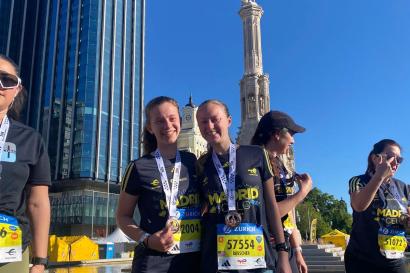Thirty-six hours before I left my heart behind as my plane took off from Madrid with a semester’s worth of luggage in the hold, I was in a royal palace.
Specifically, I was at El Pardo – it’s worth specifying, because Spain has dozens and dozens of royal palaces. I’d picked El Pardo because it was the home of the notorious fascist dictator Francisco Franco, and also because it was a free twenty-minute bus ride from the center of Madrid, where I spent my semester.
In a second-floor room, our tour guide (speaking Spanish) pointed out a woven tapestry on the wall. I recognized the image instantly: it was the final product of a design by Goya. I gasped, because not twenty-four hours earlier I’d been in an art museum with one of my closest friends abroad, and she pointed out the painting that served as the model for the tapestry. We agreed that the painting was one of our favorites, and together we drew on our (mostly her) knowledge of art history to discuss the colors, composition, and design.
Enthralled by seeing process and product, I snapped a photo of the tapestry itself in the palace.
I texted that photo to two different people. The first, my mom, got a long explanatory essay on my friend, our trip to the art museum, the process of Spanish tapestry-making, and who Goya was, so that she could tentatively begin to understand why I was so excited by this tapestry.
The second, my friend herself, got four words – “Look what I saw!” – and she understood the photo in richer detail and sharper thrill than my mother ever could.
I’ve been home for almost two weeks now, and the hardest, most frustrating thing is that I never get to say “Look what I saw!” to anyone anymore. Every memory is a long essay about Spanish history and culture or it is flimsy. For my parents to understand any of my stories, I have to explain my whole life abroad, and often it’s still not enough.
It’s exhausting, and the products are always duller than what four words could convey to someone who shared the same context and knowledge and interest and life that I did for four months. I bend over backwards trying to explain why my stories matter and they just can’t get it, not like my friend could. I miss being able to say four words. I miss sharing memories and not just telling stories.
I’m exceedingly lucky: my departure was eased by the knowledge of return. My family will be visiting several cities in Europe, including Madrid, in June; this made it a little easier to leave, since it wasn’t “goodbye” so much as “see you next month.” I’ve even been put in charge of designing my family’s itinerary for the Madrid portion, so that I can be sure to show them all of my favorite spots.
But designing that itinerary, thinking of returning to places that I understood without the context of my life abroad that helped me understand them, has been unexpectedly frustrating. In fact, at times it’s made me deeply angry. It’s hard to explain why, except that I’m planning a family day trip to El Escorial and to be honest I don’t really want to go to El Escorial as my family’s tour guide, I want to go with my friend and notice every little detail that’s familiar to us from our History of Madrid and Spanish Architecture classes that my parents will never understand.
I think of being in that space where my friend explained El Greco’s use of shadow and we recited all the Spanish kings in order with people who have never heard of El Greco or Carlos V, and my head sears with frustration and I want to scream. This isn’t right, this isn’t how it should be; the rules of that place should dictate that I’m surrounded by people who get it. How am I meant to understand El Escorial without a fundamental part of what defined it: being with friends?
Put another way, I don’t want to sit in Madrid’s best churro restaurant and explain what porras are to a table of people who have never heard of them. I want to sit in Madrid’s best churro restaurant and split an order with people who know that only tourists drink the hot chocolate (and that they should use the spoon).
Put a third way, I miss my friends.
I’ll get to visit some of them, I know (I don’t really know this, I hope it, but I have to say “I know” or I’ll go insane), but I’m not even sure how much this will help. I don’t really know if I want to meet their American selves. I want to be with their Spanish selves forever and ever, eating churros and discussing Goya and climbing up windowsills to watch battle reenactments and slipping through the Rastro and I don’t want to explain what any of that means anymore. I want to see in passing the friends with whom I am too bad at texting to keep up with; I want to gossip about certain classmates with people who know exactly who I’m talking about; I want to walk into a house with Disney movies playing and sisters arguing and chicken cooking. I miss it, and I miss people getting it without a dissertation’s worth of background.
I’m trying not to be angry at my parents when they don’t understand the photo of the tapestry. It doesn’t always work. I get frustrated and sometimes I want to yell at them and sometimes I want to cry. (Sometimes I do yell at them; sometimes I do cry.) It’s a difficult journey coming to the understanding that although I will be back in Madrid and back with my friends and back in a place I understand, it will not be the same, not soon and not ever, forever for the rest of time. Being back is hard.
I want to draw some hopeful, optimistic conclusion here, maybe about how my mom is really interested in the photo of the tapestry even if it takes longer to explain, but I don’t really have one. Nobody understands what that tapestry means except the girl who went to the art museum with me; nobody will. It’s frustrating and angering and there’s nothing that will make it not that way, except to ignore it and pretend it didn’t happen and forget that I ever spoke a language that my parents don’t speak or ever shared memories so tightly that four words was enough to conjure a world. Sometimes the forgetting seems enchantingly easy, and that is the reason I will not let myself succumb to it.
The only thing that I’ve found is to let myself cry. When I find the drawing that my seven-year-old host sister made me and all the stories in the world will not be enough for anyone else to understand how her little body felt curled in my lap as she drew, I let myself cry. Then my parents ask about her and I cannot explain her (how do you explain a whole human being, lively and alive?) and I want to yell at my parents for not sharing the visceral, embodied knowledge of her that I have. I find Book of Mormon and Real Madrid tickets slipped between pages of my books and I do not want to explain those experiences, I want to have them again, and I won’t. And then I want to rip the tickets in half and I want to yell at my family and all I can think to do is cry.
It will get easier (probably, hopefully) as I build new embodied knowledge here. I’ll adjust to the mealtimes eventually and I’ll go back to college and be with those friends and we’ll share new memories and it will be okay, but it won’t ever be the same, and that’s what’s unbearably hard.
I don’t have advice, besides cry, feel, hurt; “don’t be cruel” does not mean “don’t be angry.” Do not run away from the ache of missing because it means it meant something real. And it is okay to be sad, to wrestle with the inescapable hurt that is the only conclusion I can draw after two weeks at home: I want to go back to the Pardo, but more than that, to be the person I was there.

Maple Buescher
Hi!! My name is Maple and I'm a junior at Bates College, where I am a member of the sailing team, the orchestra, and everything in between. I am the Editor in Chief of our student newspaper and am interested in pursuing a journalism career.







